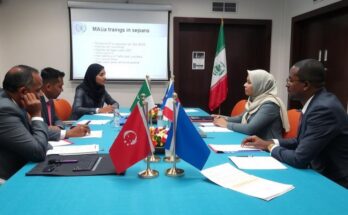The recent passage of Israeli laws targeting UNRWA threatens vital services for millions of Palestinian refugees, risking a humanitarian crisis in Gaza. The laws prohibit UNRWA from operating in Israel and cut off interaction with Israeli authorities. Given the agency’s critical role in education and healthcare, its cessation could severely impact the lives of Palestinians, escalating radicalization and undermining their refugee status. Calls for international intervention to address the situation grow as humanitarian needs intensify.
In a troubling development for Palestinian refugees, the Israeli parliament has enacted two laws that threaten to dismantle the United Nations Relief and Works Agency for Palestine Refugees in the Near East (UNRWA). This change is poised to curtail essential humanitarian services provided by UNRWA, impacting millions who rely on the agency for healthcare, education, and other critical support. As of now, an estimated 2.1 million Palestinians in Gaza and additional populations in the West Bank depend on UNRWA for their basic needs, raising fears of a humanitarian crisis.
On October 28, the Knesset passed legislation that prohibits UNRWA from operating within Israeli territory and forbids Israeli authorities from any interaction with the agency. These laws will come into effect within 90 days and do not propose an alternative means of assistance, intensifying the vulnerability of Palestinian refugees. Philippe Lazzarini, UNRWA’s commissioner-general, has voiced his distress at this decision, emphasizing its potential to exacerbate an already dire humanitarian situation in Gaza, which has been hit hard by a protracted conflict resulting in significant loss of life.
The continuous operation of UNRWA has been vital since its establishment in 1948, following the displacement of Palestinians during the formation of the Israeli state, an event often referred to as the Nakba. The agency aims to uphold the rights of Palestinian refugees, including their right of return, amidst ongoing tensions in the region. Critics in Israel argue that UNRWA perpetuates the refugee crisis by maintaining this claim. However, the loss of its services is likely to destabilize the region further, as emphasized by various humanitarian groups and international organizations.
Despite facing allegations of infiltration by militant groups, UNRWA has maintained a commitment to neutrality and humanitarian assistance. Recent investigations into the agency have resulted in some staff dismissals, yet funding for UNRWA has been crucial for sustaining its operations. The removal of UNRWA from Gaza threatens fundamental services, with Lazzarini warning that it could lead to increased radicalization among youth, further straining an already volatile social landscape.
Currently, UNRWA serves over 660,000 students in its educational programs in Gaza and provides crucial healthcare services to approximately 500,000 refugees. The new laws risk not only the jobs of 17,000 employees but also the fabric of social services necessary for Palestinian refugees’ survival. As humanitarian conditions deteriorate, relief groups have signified that Israel’s policies obstruct aid delivery, contributing to chronic shortages of food, clean water, and medical supplies within the region.
In closing, the enactment of these laws against UNRWA stands as a notable inflection point, indicating a potential intensification of the humanitarian crisis within Palestinian territories. Should UNRWA cease its operations, refugee status—an essential component of Palestinian identity and rights—may be jeopardized, raising alarm for the international community about the far-reaching implications for peace and stability in the region. The overarching narrative portrays a desperate need for an entity like UNRWA until a viable state mechanism for providing services to Palestinians is established.
“This idea that UNRWA could not be supplemented is absurd.” – Israel’s UN Ambassador Danny Danon.
“The delivery of food, shelter, and health care to most of Gaza’s population would grind to a halt.” – An UNRWA spokesperson.
“It opposes the UN Charter and violates the State of Israel’s obligations under international law.” – Philippe Lazzarini.
The background of this issue centers around the longstanding Israeli-Palestinian conflict, with UNRWA established to support Palestinian refugees displaced during the creation of the State of Israel in 1948. Over the decades, UNRWA has played a critical role in providing aid, education, and health services to millions of Palestinians across various territories. However, it has faced ongoing scrutiny and criticism from the Israeli government, which accuses the agency of being infiltrated by militant groups and perpetuating the refugee crisis. The recent laws passed by the Israeli parliament represent an attempt to dismantle UNRWA’s framework of support, raising alarms about the resultant humanitarian consequences for Palestinian populations dependent on its services.
The implications of the new legislation against UNRWA are profound, potentially dismantling the very support structures essential for Palestinian refugees. Without UNRWA’s involvement, healthcare, education, and humanitarian aid in Gaza would face near-total collapse. As both the Palestinian community and the international community await the full impact of these changes, the urgent call for alternative solutions and diplomatic efforts is more critical than ever to uphold the rights and dignity of Palestinian refugees and ensure stability in the region.
Original Source: www.arabnews.com




